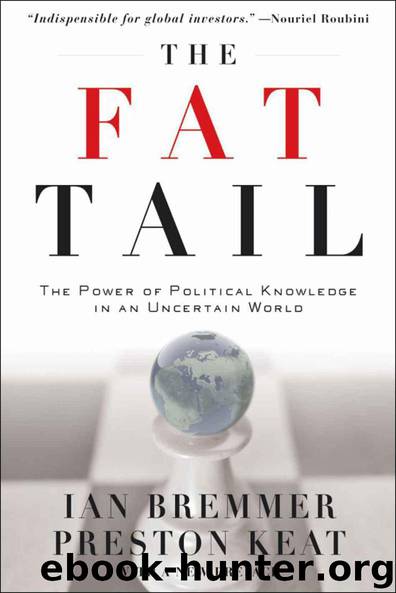The Fat Tail:The Power of Political Knowledge in an Uncertain World (with a New Preface) by Bremmer Ian & Keat Preston

Author:Bremmer, Ian & Keat, Preston [Bremmer, Ian]
Language: eng
Format: mobi, epub
Publisher: Oxford University Press
Published: 2010-05-13T05:00:00+00:00
A number of economic factors also affect the likelihood of expropriations. One is an overtly statist economic policy. In 1975, Great Britain expropriated the (already bankrupt) British Leyland Motor Corporation, which was perceived as having a strategic value for Britain and for labor relations.15 This followed an earlier spate of nationalizations in Western Europe, where after World War II, governments under the influence of Socialist and/or Keynesian economics attempted to either set up state-controlled “natural monopolies” in certain sectors such as energy and telecommunications or to take over strategic manufacturing industries.
Another rationale for expropriating property, particularly in developing states, has to do with structural economic inefficiencies, such as a government’s inability to collect taxes, tackle corruption, service its debt, or maintain financial discipline. In difficult budgetary conditions, expropriation (usually surrounded by nationalist or ideological rhetoric) can provide a government with a quick infusion of cash. Not surprisingly, some analysts point out that there is a relationship between lack of economic growth and expropriations: Governments can expropriate firms as a response to economic problems, which they can then blame on foreign firms.16
Others note that governments are more likely to expropriate commodity-producing industries when commodity prices are high.17 The recent expropriations in the oil and gas industries in Russia, Venezuela, and Bolivia make sense in this context.
A number of technical factors can influence a government’s economic motivations for expropriating investment. One is the ability of the expropriating country to market18 and sell the seized investment. This is one of the reasons extractive industries are often especially prone to expropriation: it is relatively easy to sell oil, gas, and other commodities.
The availability of the right technology and managerial talent can make a difference, as well. Governments have economic reasons for avoiding the expropriation of firms in high-tech sectors—bureaucratic mismanagement can kill such industries. In high-tech fields, governments more typically try to push for intellectual property transfers and highly restricted operating environments; these may amount to “creeping expropriation” but are rarely examples of “outright expropriations.”
For some governments, whose interest is more in gaining greater tax revenue and control of cash flows than in the domestic political capital gained, “creeping expropriations” are a more common tactic. In 2004, China announced a set of regulatory policies in its domestic automotive sector that banned “the sale and transfer of manufacturing licenses by bankrupt or failing manufacturers”19 to either domestic or foreign investors. The rules also required investors setting up new automotive plants to invest at least $240 million and to invest in research and development, which would then become Chinese-owned intellectual property. By prohibiting automotive companies from selling their licenses and imposing intellectual property requirements, the Chinese government limited the ability of foreign corporations to viably operate as private enterprises in China’s automotive sector.
Do expropriations make intermediate-term economic sense? That’s another question, and not one that we will address in detail. In brief, however, most developing countries that have nationalized entire industries have not achieved robust and sustained levels of development. Following the nationalization of its oil
Download
The Fat Tail:The Power of Political Knowledge in an Uncertain World (with a New Preface) by Bremmer Ian & Keat Preston.epub
This site does not store any files on its server. We only index and link to content provided by other sites. Please contact the content providers to delete copyright contents if any and email us, we'll remove relevant links or contents immediately.
The Secret History by Donna Tartt(19060)
The Social Justice Warrior Handbook by Lisa De Pasquale(12187)
Thirteen Reasons Why by Jay Asher(8895)
This Is How You Lose Her by Junot Diaz(6877)
Weapons of Math Destruction by Cathy O'Neil(6267)
Zero to One by Peter Thiel(5789)
Beartown by Fredrik Backman(5738)
The Myth of the Strong Leader by Archie Brown(5501)
The Fire Next Time by James Baldwin(5432)
How Democracies Die by Steven Levitsky & Daniel Ziblatt(5216)
Promise Me, Dad by Joe Biden(5146)
Stone's Rules by Roger Stone(5081)
A Higher Loyalty: Truth, Lies, and Leadership by James Comey(4955)
100 Deadly Skills by Clint Emerson(4921)
Rise and Kill First by Ronen Bergman(4780)
Secrecy World by Jake Bernstein(4743)
The David Icke Guide to the Global Conspiracy (and how to end it) by David Icke(4709)
The Farm by Tom Rob Smith(4502)
The Doomsday Machine by Daniel Ellsberg(4485)
